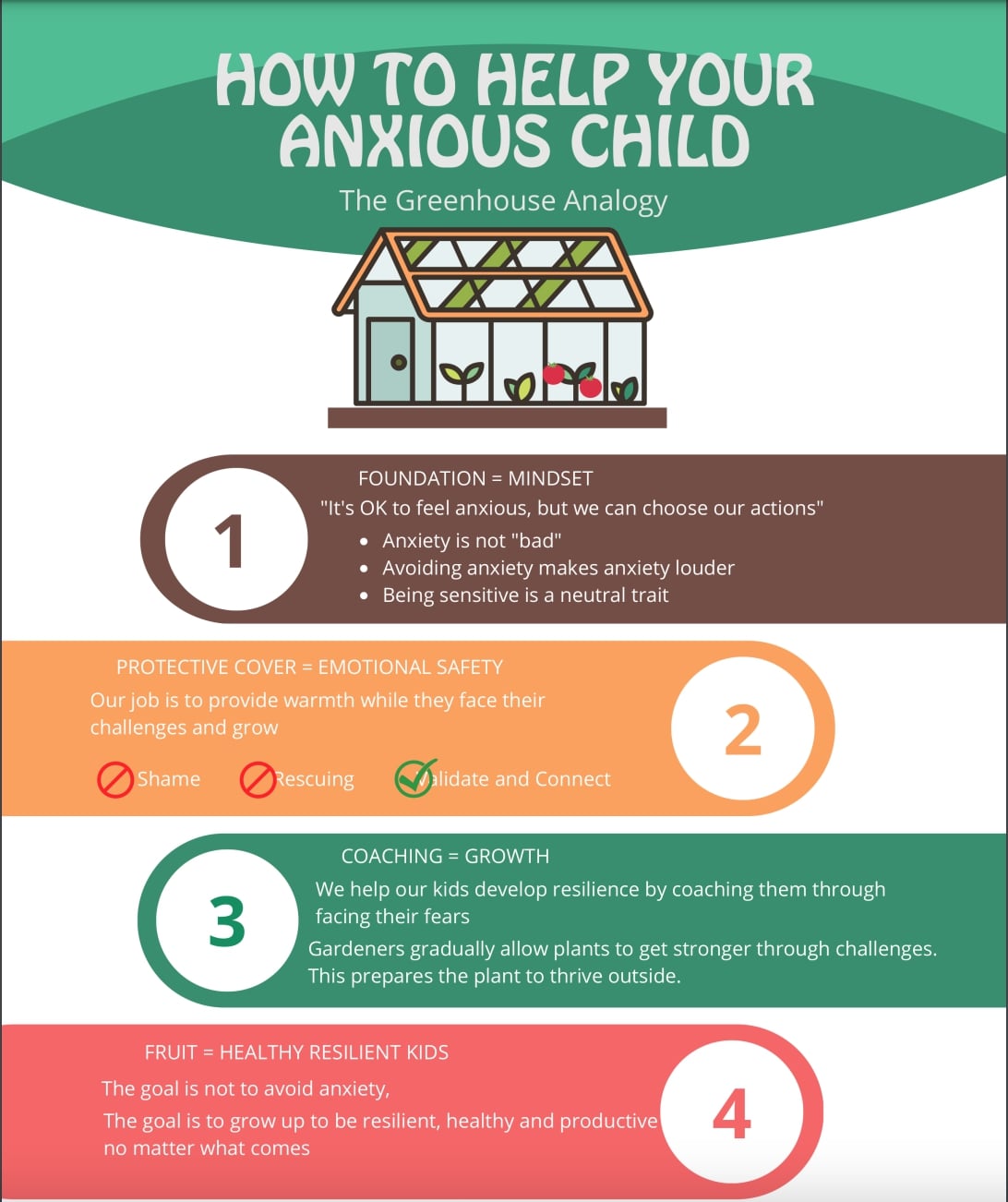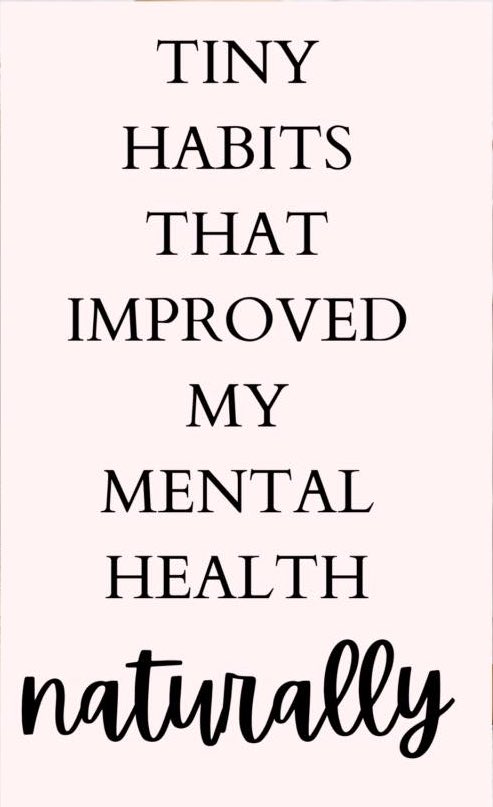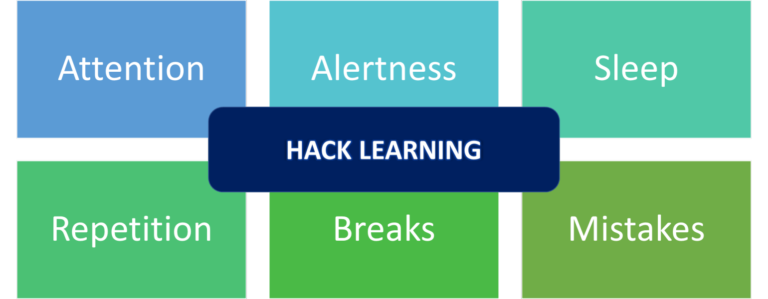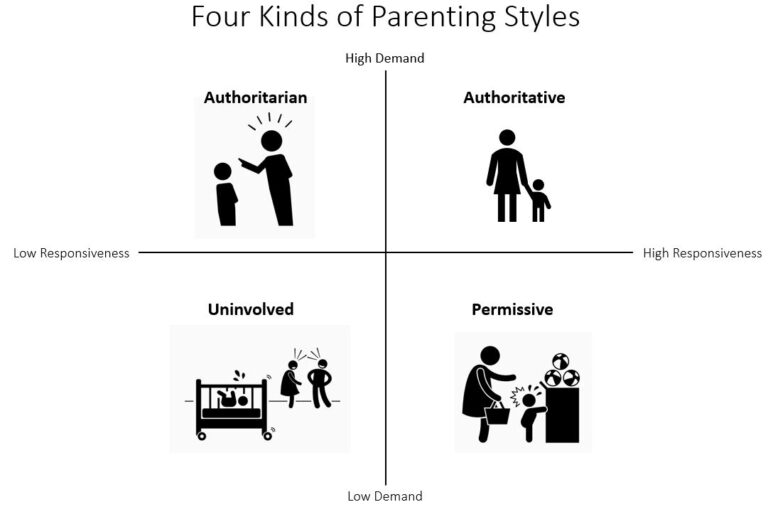Anxiety in children is absolutely treatable.
Before we get started let me tell you the most important point which is,
research has shown that intervening with parents is more helpful than intervening with kids.
There are literally hundreds of opportunities a week for you to show your child how to manage anxiety.
We’ll learn various simple, straightforward practices in daily lives of kids & their parents; which are research based proven techniques. These will help your children to learn to “manage” their anxiety ofcourse with your help and constant guidance. Also we will learn how this whole process turns kids into more resilient human beings.
Over time parents can witness the transformative power of this process as your children develop into resilient individuals equipped to face life’s challenges head-on.
Let’s learn how to change a parent’s mindset around anxiety. ( tap / click to jump to the respective topic )
1. How to teach kids to manage anxiety ?
2. How to create an environment where your children can grow through their anxiety and overcome it ?
3. Coping Skills for Kids with Anxiety – Teach your kid to face their fears with scaffolding
5. Conclusion
How to teach kids to manage anxiety ?
Let’s learn 4 principles for helping your anxious kid.
Principle 1 :
It is more effective to change parents’ approach to anxiety than to teach your kids skills or only send them to theropy. Every parent has 168 hours per week ( 7 * 24 ) to interact with and influence your children, and kids absolutely look to their parents to know how to respond to situations. Kids look at their parents to know how to respond to stimuli
You can teach them to have a healthy relationship with fear and anxiety.
So instead of teaching them to avoid anything that makes them anxious you can teach them to have a good relationship with their emotions.
One of the big mistakes that parents make around anxiety is worrying that anxiety itself will harm their child. We get really worried about our kids being worried, or we worry that anxiety is going to ruin their lives.
We basically are afraid of fear itself.
Principle 2 :
As parents, it’s very important to understand that Anxiety is not a negative emotion, it’s just an emotion.
It happens to be an uncomfortable emotion, but it’s not bad. The problem is not the anxiety; it’s when we label anxiety as the danger. It’s okay to have feelings, but I don’t have to act on them.
A bad relationship with anxiety can harm your child. And that means avoiding anything that makes them anxious.
In the short and long term that will harm your child for sure.
The truth is that avoiding anxiety and triggers actually makes anxiety worse, not better. They don’t learn to be independent, they don’t learn the skills to talk with people, and that’s more harmful in the long run than a feeling.
Again remember, anxiety, a feeling itself is uncomfortable, but it’s not dangerous. Anxiety will not harm your child by itself.
Change your mindset to a new mindset, this new minset is to think, “I can handle feeling this emotion, and so can my child.” I can make space to feel this and still be okay.
When we learn to have a good relationship with our feelings in general, when we get really good at feeling them, then a lot of times these feelings just pass along in their merry way. It’s only when we resist or suppress emotions or we give into emotions by avoiding situations that emotions start to control our lives.
Good parents don’t prevent their kids from feeling anxious; they teach their kids how to relate to anxiety, how to interact with anxiety in a healthy way, in a way that gives them more choice and more power in their lives. It teaches them a sense of self-efficacy, a belief in their own resilience.
So parents’ main goal is to wire their kids to have a resilient relationship with emotions, not to wire our kids to just get rid of anxiety, because, one, it doesn’t work, and two, it sends the message that society is dangerous, which it isn’t; it’s just uncomfortable feeling or situations.
Principle 3 :
For parents with sensitive child / children. Being sensitive is not a negative trait, being sensitive is a personality trait, but knowing what to do with emotions is a skill that can be learnt.
Parenting is just a wonderful opportunity to do our own work first and later help the kids. Being sensitive is a gift, not a weakness.
Some of the most impactful people in history have been highly sensitive, and that trait helped them change the world for good. Couple of examples are Gandhi and Einstein. Teach your kids about these people and ask them to learn from their way of using sensitive emotion for the good of mankind.
Principle 4
Anxiety cycle, what is it ? How does it happen ? Anxiety is a natural and helpful emotion that’s supposed to protect us from real physical danger, like rattlesnakes and cliffs.
But when we feel anxious about things that are actually safe, like public speaking or social situations, and then we avoid those situations, we actually increase our anxiety.
The Anxiety cycle – when we avoid anxiety it grows
Avoidance of things that we think may be dangerous actually makes our anxiety grow and grow, but that’s because avoidance feels good in the short term.
It can feel kind of addictive, and that leads us to feeling more and more anxiety, which spirals into a situation where our world is shrinking as we avoid more and more situations. This is the Anxiety Spiral or Anxiety Cycle.
The good news is that just as the brain learns that something is dangerous when we avoid it, it can also learn that something is actually safe when we face it and survive. Our brain’s inherent ability to rewire itself is called neuroplasticity. So this means that we can change the physical structure of our brain by changing how we think and how we act.
So what’s the solution for this Anxiety cycle ?
In essence the most powerful and effective way to combat anxiety is to distinguish between real and perceived danger and then to gradually face those fears instead of avoiding them. When we do this our brain learns that we’re safe, and it actually decreases our anxiety levels.
An anxiety disorder is not a permanent trait.
It’s a scale. It’s not an on/off switch. Like,you can learn the skills to turn the volume down on anxiety so that it no longer runs your child’s mind.
The most effective way to help kids with anxiety is to help parents develop a new framework because they model for the kids 168 hours a week how to relate to emotions.
anxiety is not a bad emotion. It’s just a messenger asking us to consider whether something is safe and to carefully choose our actions.
How to create an environment where your children can grow through their anxiety and overcome it ?
As a parent it is our most important task to create an environment where our children can grow throught their anxiety and overcome it. We’ll use the analogy of “Greenhouse” to learn more about this.
The goal of a greenhouse is not to protect plants or to Simply keep plants safe, the goal of a greenhouse is to create a space where plants can grow up to be functional, healthy and productive Outdoors.
Similarly job as a parent is not to protect your child from anxiety but to help them learn to be resilient so that they can be functional and healthy humans to learn the skills to manage emotions and make good choices.
Let’s learn in detail about laying the foundation for your kids success, how to create the environment for your kids success ?
Your child’s / kid’s physical and emotional safety are like the protective cover of your Greenhouse.
Children are hardwired to seek connection with their parents and they rely on that connection to determine if they feel safe or fearful so your connection provides warmth while they face challenges and grow so the kids are actually super resilient and super adaptable and just like them you can grow and change too.
As a parent, you’re not responsible for changing how they feel your job is to walk with them on their journey to build a belief in themselves that they can face the challenges that come their way kids often don’t remember what they were anxious about they remember what their parents did with it
Some of the most effective dialogs from parents to their anxious kids should be as below
“You look uncertain, can you tell me about that. hmm it’s okay to feel anxious it’s a normal feeling I’m here for you and I’ll help you through this let’s take a deep breath together and work through this “
“we can come up with a plan to help you face this I love you no matter what and we’ll get through this together”
With your constant and loving support; your kids will get stronger and more resilient over time.
Coping Skills for Kids with Anxiety- Teach your kid to face their fears with scaffolding
Raising resilient kids with 4 steps; similar to taking care of saplings in a greenhouse before they are ready to be planted in an open environment.
1. Foundation = Your Mindset
2. Cover = Emotional Safety
3. Coaching = Growth
4. Fruit = Healthy Resilient Kids
There are four main steps to coaching our children through anxiety and helping them develop copied skills
1. Connect with them emotionally
this means to validate without judging them or the feeling structure tasks so that children spend more time in the Learning Zone now we don’t want our kids to get stuck in their comfort zone where they’re avoiding difficulties as this can make them less resilient over time but we also don’t want them to get thrown into tasks that are too big for them to handle all at once and that can lead to feeling like overwhelmed and panicked
it’s totally okay to feel nervous while doing something new it’s actually great because it primes your brain to learn when your child feels nervous but succeeds at facing their fears her brain is more plastic and rewires to believe that she is capable and then her anxiety decreases over time so your Mantra here is it’s okay to feel scared or anxious or nervous but we can choose our actions
2. Break the task down into baby steps
3. Help them practice skills
4. Given them plenty of attention when they face fear
When your child feels nervous but succeeds at facing their fears her brain is more plastic and rewires to believe that she is capable and then her anxiety decreases over time so learn the skill of facing fear it’s a skill that can be learned but it may take practice
practicing tolerating a big emotion and saying it’s okay to feel that like look you handled feeling anxious and did your best
No one is born knowing what to do with their emotions, but it is a skill that can be learned. Are you ready to learn how to control your emotions ?
1. What you as a parent can do is to help your child predict and rehearse how they’ll respond to a stressor ?
Predicting can be a really powerful way to help kids develop the skills to face anxiety.
2. create a safe and consistent environment.
Your relationship is the number one thing that helps your child feel safe, but second to that consistent routine is really powerful. So when your morning and evening routines are consistent and predictable, your child learns what to expect. When you consistently expect them to go to school or do their homework, the uncertainty is gone, and that can really help them decrease their anxiety and step up to the task at hand.
3. mantras can be really helpful.
We aren’t just telling kids to get over it, be tough, but instead we’re fostering resilience by paying attention to their ability to face their fears and overcome challenges with our support.
4. Practice / Acting it out
Something you can do is to notice the worrying thoughts.
We coach our children to acknowledge their thoughts and feelings and then make a choice about what action they’ll take.
5. Parents can create a shame-proof environment in your home by telling stories about yourself.
Tell stories about times where you felt nervous, times when you were scared, times when you avoided something and regretted,
Another thing that’s important to do is lots and lots of emphasis around successes.
What you pay attention to, you get more of. So if you put a lot of attention on the things they’re scared of, they’ll get more scared. And if you put a lot of attention on the things that they accomplished and their successes, they’ll feel more resilient.
Another thing you can do is create a safe space for your kids, like a book full of happy photos they choose or a comfortable blanket or a chair where they can calm down and recharge.
You could also help your kid develop good physical health. So physical health is essential to mental health.
Kids and adults are less resilient when they’re tired or hungry or when they’ve had too much sugar. So just make sure your child gets enough sleep, exercise, and sunlight. Make sure they have time to play with their friends and also down time to relax. Don’t keep them too busy. And, you know, you want to try when possible to help them eat healthy food.
You can also teach them some skills to calm themselves down, like deep breathing and how to self-soothe.
You can also help them soothe and regulate their nervous system by hugging them and touching them, with eye
contact or talking calmly with them. And this is called co-regulation, and it’s one of the most powerful ways to regulate emotions.
Your child has a need for connection, and they have a need for closeness, The most important thing in the world to a kid is their connection with their mom and dad, so it can be helpful to plan in a consistent one-on-one time with them where they have your full attention and the two of you do something positive together.
You send the message that, “We can connect in a really intense, fun way, not just when you’re anxious.” And I would just say schedule this in so that you make sure that it happens. And you might be surprised at how many problems this prevents. So this is called, in psychology terms, a child-directed interaction, and it’s one of the most prescribed interventions for parents of anxious kids.
Conclusion
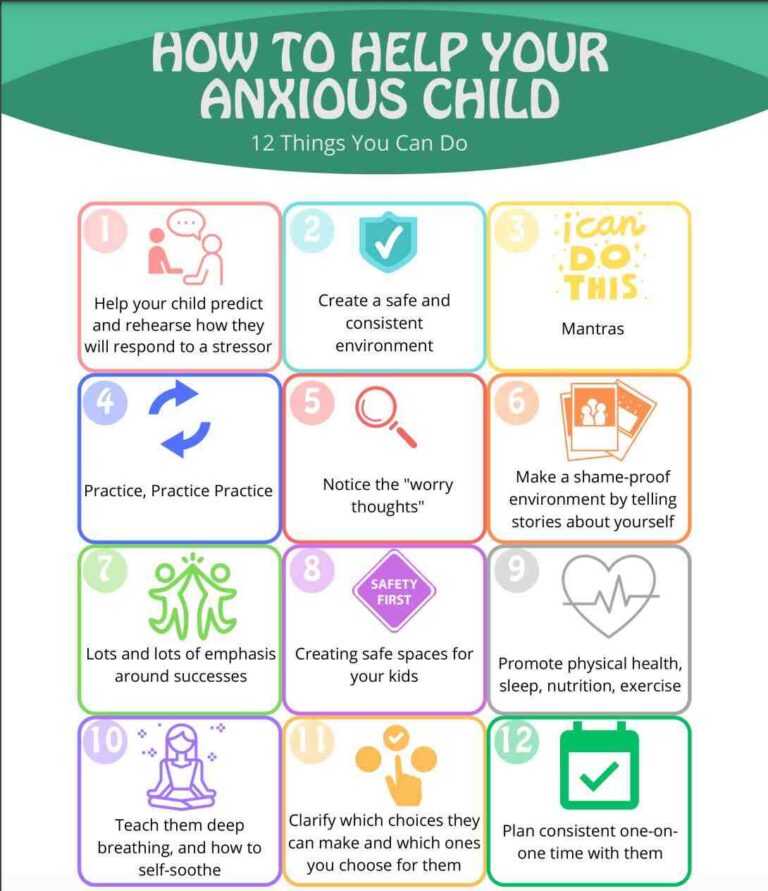
Let’s summarize all the important points learnt above. Helping your child manage anxiety requires a shift in mindset and a supportive approach from parents. Intervening with parents has been found to be more effective than solely focusing on teaching skills to children.
Parents play a crucial role in modeling how to respond to situations, and children look to their parents for guidance on managing anxiety. It is important to understand ( by both parents and kid ) that anxiety is a natural and normal emotion, it’s definitely not something inherently negative or harmful.
It is crucial for children’s long-term wellbeing to learn how to deal with worry, fear, anxiety in a healthy way rather than avoid it.
Parents can help their children develop resilience and coping skills by creating a safe and supportive environment, breaking tasks into manageable steps, and providing emotional validation and support.
Additionally, parents can practice predicting and rehearsing responses to stressors, establish consistent routines, use empowering mantras, and create a shame-proof environment where successes are emphasized.
Teaching children self-regulation techniques, promoting physical health, and nurturing a strong parent-child connection are also crucial aspects of managing anxiety. By implementing these strategies and working together with their children, parents can help their anxious kids develop the skills and mindset needed to navigate anxiety and lead healthy, resilient lives.

